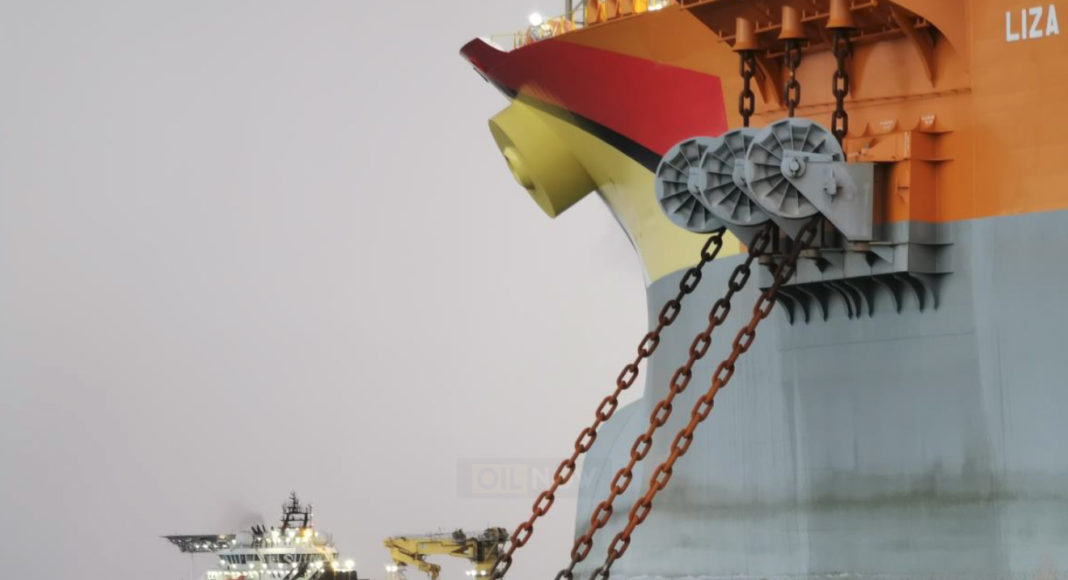Exactly 12 months have gone by since Guyana produced its first barrel of oil at the offshore Stabroek block where US oil major ExxonMobil is operator. This milestone came just under five years from the world-class Liza discovery in 2015 making it one of the fastest production ramp-ups in history and ushering in a new era for the South American country.
More than 1700 Guyanese men and women worked on the Liza Phase 1 Development project including those trained in Singapore who worked on the Liza Destiny FPSO.
“We are proud of our work with the Guyanese people and government to realize our shared long-term vision of responsible resource development that maximizes benefits for all,” Darren Woods, Chairman and Chief Executive Officer of Exxon Mobil Corporation said as Guyana marked its entry as an oil producing nation.
Cocktail, firework display usher in Guyana’s entry as oil producing nation
The Liza Destiny FPSO was built and is being operated by Dutch floater specialist, SBM Offshore.
“The vessel is producing the first oil in Guyana’s history,” Bruno Chabas, CEO of SBM Offshore said at the time. “We are looking forward to further generating value for our client ExxonMobil and in particular with respect to making a contribution towards Guyana becoming a significant oil producing country.”
Production at the Liza field has continued despite unforeseen challenges since the first barrel of oil was produced on December 20, 2019. Chief among them are the coronavirus pandemic and an issue with a gas compressor system on the Liza Destiny FPSO that resulted in longer than anticipated flaring.
On the pandemic front, ExxonMobil has been able to conduct operations with no cases so far. The company has moved over 6,000 people offshore since March.
“To date we’ve moved over 6,000 people offshore and not had one single case of COVID-19 offshore, which is truly remarkable,” Alistair Routledge, President of ExxonMobil Guyana said.
Meanwhile, the challenge concerning the gas compressor system has been resolved. The company said production has reached peak capacity of 120,000 barrels per day.
“ExxonMobil Guyana is committed to the responsible development of the country’s natural resources and will not utilize routine flaring during our operations,” Routledge said. “We are disappointed by the number of equipment issues experienced and that, because of these issues and COVID-19, commissioning of the gas injection system took longer than originally projected. We took significant steps to limit flaring and are incorporating lessons learned for future projects.”
This first phase of oil production at the giant Liza field marks a significant turning point for Guyanese. It provides the country with an unprecedented opportunity to change its fortunes as oil revenues begin to come in and are set to significantly increase in the coming years.
“We just have one FPSO out there and…at the end of this year we’ll have close to 200 million US dollars from that one FPSO. The other two FPSOs for Liza 2 and Payara are double the capacity of the one that is operating out there right now,” Vickram Bharrat, Minister of Natural Resources, told OilNOW. “That by itself would show the amount of revenue that will be coming in.”
Guyana’s President Dr. Irfaan Ali, said he will be looking to ensure that robust systems are in place for the management of these revenues so that benefits to current and future generations are maximized.
“We have to have the right governance structure before we think about touching the resources and we have to have that Sovereign Wealth Fund well thought out, one that acts in the immediate needs of our country while at the same time safeguarding the future generations,” President Ali said.
Industry analyst Wood Mackenzie says the unprecedented investments in oil that Guyana is experiencing will see the country adding significantly to South America’s production, which together with Brazil, will push output to more than 2.5 million b/d by 2025. It is expected that by 2030, Guyana’s output will exceed one million barrels per day making it one of the top producers in the Caribbean and Latin America region.
The Liza field is approximately 190 kilometers offshore in water depths of 1,500 to 1,900 meters and is part of the Stabroek Block, which measures 6.6 million acres, or 26,800 square kilometers.



